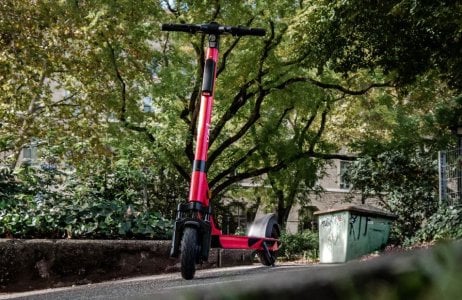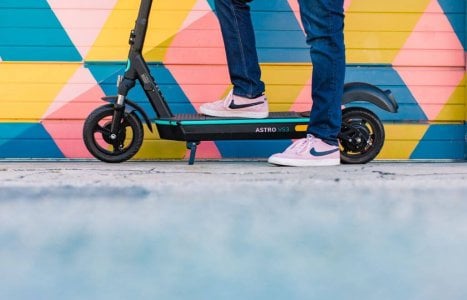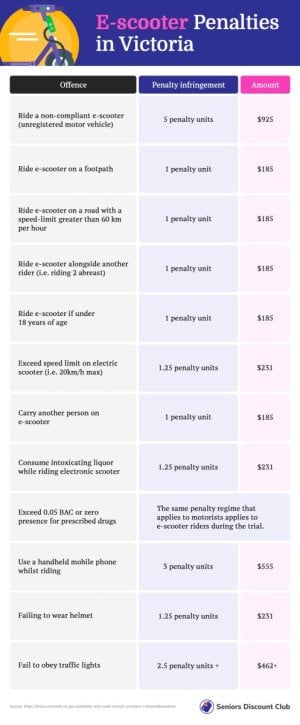Outlaw no more! This 79-year-old can now legally use her favourite mode of transportation
- Replies 14
When it comes to getting around, Lea always thought she’d have to be a bit of an 'outlaw'. That’s because her preferred mode of transport has always been her trusty e-scooter…
That is until the Victorian state government made the decision to make e-scooters legal on the state’s roads on April 5th this year, making Lea an ‘outlaw’ no more!
Lea Weaver, a 79-year-old Melbourne native, said she’s glad she no longer needs to avoid the police when riding her e-scooter around town.
‘It is a relief to know that I'm not actually breaking the law anymore. It just made sense to have that law change – everybody was using scooters anyway,’ she shared.
Last year, the inner-city councils for Melbourne, Yarra and Port Philip and the regional city of Ballarat started an e-scooter trial with the Victorian government. It was originally expected to end in February 2023.
But deliberation was extended so the Department of Transport and other agencies could collect and finalise the data they needed.
Roads and Road Safety Minister Melissa Horne said the trials had been an ‘enormous success’ at the time.
‘In Ballarat, there have been more than 200,000 short trips that have been taken during the course of this trial, and predominantly they've been used for economic purposes, like to get to the shops, to get to a venue,’ she said.
Ms Horne also stated that extending the trial was an important step in recognising how the vehicles were being used and in developing new road rules to accommodate the users.
‘We know that there are more than 100,000 private e-scooters out there on the network, so being able to look at how they're being used and get the appropriate regulatory settings in place over the next six months,’ Ms Horne explained.
Until recently, riding private e-scooters on Victorian roads was illegal. Now, private e-scooters have been allowed on Victorian roads with a speed limit of 60 kilometres per hour (km/hr) or less starting April 5.
Riders must also be at least 16 years old and be able to comply with road rules, such as wearing a helmet and sticking to the same blood alcohol content and drug use restrictions as other vehicle drivers.
The current value of a penalty unit in Victoria is $184.92.
For Ms Weaver, an e-scooter was the solution to her mobility issues.
About 10 years ago, she developed a medical condition that impacted her feet and made it painful to walk.
‘I was suffering from plantar fasciitis, and it just seemed an ideal way to get around. I thought an e-scooter would just be so cool, and it was, indeed, better than a wheelchair,’ she revealed.
Because of her experience, she is now encouraging more people her age to consider using e-scooters to travel short distances, especially if they find it difficult to walk.
Not only does she believe they are convenient, but also (relatively) safe, fun to use, and non-polluting (compared to cars).
‘It would be lovely if more people used scooters to get around and we were able to have a city more like Amsterdam,’ she said before adding that she felt ‘very safe’ on scooters.
‘They’re very close to the ground. You can just step on and step off,’ she explained.
Despite that, Mark Putland, Director of Emergency at the Royal Melbourne Hospital, said they were seeing 40-50 significant injuries a month involving e-scooters.
‘Every single day…We see people with nasty, life-changing injuries on e-scooters at the moment,’ he told reporters.
‘It doesn't look like they [e-scooters] are going away … we need to think hard about how we make these things safe,’ he continued.
Dr Putland mentioned that risky behaviours, such as riding e-scooters when inebriated, overfatigued, or on drugs, and riding without helmets or with two people on a scooter, were the main causes of accidents.
He said the solution ‘can’t all be enforcement’.
‘We need to build a culture of sensible behaviour and accountability within the community of people using the things,’ he concluded.
According to the Victorian government, safety risks increase ‘significantly’ when riders do not follow road rules.
‘We recognise that there are safety concerns associated with e-scooter use and have taken steps to regulate e-scooter use in order to improve safety outcomes for e-scooter users and for those who interact with them on the transport network,’ they stated.

Do you use an e-scooter or would you consider it? What do you think about this road rule being lifted? Share your thoughts in the comments!
That is until the Victorian state government made the decision to make e-scooters legal on the state’s roads on April 5th this year, making Lea an ‘outlaw’ no more!
Lea Weaver, a 79-year-old Melbourne native, said she’s glad she no longer needs to avoid the police when riding her e-scooter around town.
‘It is a relief to know that I'm not actually breaking the law anymore. It just made sense to have that law change – everybody was using scooters anyway,’ she shared.
Last year, the inner-city councils for Melbourne, Yarra and Port Philip and the regional city of Ballarat started an e-scooter trial with the Victorian government. It was originally expected to end in February 2023.
But deliberation was extended so the Department of Transport and other agencies could collect and finalise the data they needed.
Roads and Road Safety Minister Melissa Horne said the trials had been an ‘enormous success’ at the time.
‘In Ballarat, there have been more than 200,000 short trips that have been taken during the course of this trial, and predominantly they've been used for economic purposes, like to get to the shops, to get to a venue,’ she said.
Ms Horne also stated that extending the trial was an important step in recognising how the vehicles were being used and in developing new road rules to accommodate the users.
‘We know that there are more than 100,000 private e-scooters out there on the network, so being able to look at how they're being used and get the appropriate regulatory settings in place over the next six months,’ Ms Horne explained.
Until recently, riding private e-scooters on Victorian roads was illegal. Now, private e-scooters have been allowed on Victorian roads with a speed limit of 60 kilometres per hour (km/hr) or less starting April 5.
Riders must also be at least 16 years old and be able to comply with road rules, such as wearing a helmet and sticking to the same blood alcohol content and drug use restrictions as other vehicle drivers.
The current value of a penalty unit in Victoria is $184.92.
For Ms Weaver, an e-scooter was the solution to her mobility issues.
About 10 years ago, she developed a medical condition that impacted her feet and made it painful to walk.
‘I was suffering from plantar fasciitis, and it just seemed an ideal way to get around. I thought an e-scooter would just be so cool, and it was, indeed, better than a wheelchair,’ she revealed.
Because of her experience, she is now encouraging more people her age to consider using e-scooters to travel short distances, especially if they find it difficult to walk.
Not only does she believe they are convenient, but also (relatively) safe, fun to use, and non-polluting (compared to cars).
‘It would be lovely if more people used scooters to get around and we were able to have a city more like Amsterdam,’ she said before adding that she felt ‘very safe’ on scooters.
‘They’re very close to the ground. You can just step on and step off,’ she explained.
Despite that, Mark Putland, Director of Emergency at the Royal Melbourne Hospital, said they were seeing 40-50 significant injuries a month involving e-scooters.
‘Every single day…We see people with nasty, life-changing injuries on e-scooters at the moment,’ he told reporters.
‘It doesn't look like they [e-scooters] are going away … we need to think hard about how we make these things safe,’ he continued.
Dr Putland mentioned that risky behaviours, such as riding e-scooters when inebriated, overfatigued, or on drugs, and riding without helmets or with two people on a scooter, were the main causes of accidents.
He said the solution ‘can’t all be enforcement’.
‘We need to build a culture of sensible behaviour and accountability within the community of people using the things,’ he concluded.
According to the Victorian government, safety risks increase ‘significantly’ when riders do not follow road rules.
‘We recognise that there are safety concerns associated with e-scooter use and have taken steps to regulate e-scooter use in order to improve safety outcomes for e-scooter users and for those who interact with them on the transport network,’ they stated.
Key Takeaways
- Lea Weaver, 79, is glad she no longer has to avoid the police while riding her e-scooter around Melbourne due to a recent law change.
- Private e-scooters with a speed limit of 60km/hr or less have been allowed on Victorian roads since April 5 for a state government trial.
- Ms Weaver encourages more people her age to consider using e-scooters for short distances, especially if walking is difficult.
- The Director of Emergency at the Royal Melbourne Hospital said they were seeing 40-50 significant injuries a month involving e-scooters, emphasising the need for safety and responsible behaviour.










